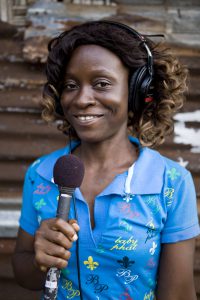 New Narratives is delighted our senior fellow Tecee Boley has been named the International Journalists’ Network (IJNET) Journalist of the Month. Tecee joined NN in July 2010 and has since notched up a string of scoops and awards including a Pulitzer Center grant to cover Water and Sanitation issues and Liberia’s Development Reporter of the Year. She was one of the first women to win a national reporting award in Liberia. Tecee’s awards have taken her to London, Sweden, Washington D.C. and Texas. She has contributed to the PBS NewsHour, US public radio and the World Policy Journal among others. See more about Tecee here.
New Narratives is delighted our senior fellow Tecee Boley has been named the International Journalists’ Network (IJNET) Journalist of the Month. Tecee joined NN in July 2010 and has since notched up a string of scoops and awards including a Pulitzer Center grant to cover Water and Sanitation issues and Liberia’s Development Reporter of the Year. She was one of the first women to win a national reporting award in Liberia. Tecee’s awards have taken her to London, Sweden, Washington D.C. and Texas. She has contributed to the PBS NewsHour, US public radio and the World Policy Journal among others. See more about Tecee here.
See IJNET’s interview with Tecee below. You can also read it here.
Each month, IJNet features an international journalist who exemplifies the profession and has used the site to further his or her career. If you would like to be featured, email a short bio and a paragraph about how you have used IJNet here.
This month’s journalist is Liberian radio and print reporter, Tecee Boley. Boley contributes to FrontPage Africa news website and newspaper and can regularly be heard on United Nations Radio. She has covered a variety of social and health-related issues that plague her region, including contaminated water, unsafe abortions and teenage prostitution.
How has IJNet helped you?
I found a Thomson Reuters course on business and finance reporting in March of this year through IJNet. The course helped open my eyes to the world of international business. I learned how the stock market works and how to monitor the success of resource companies operating in my country. It also helped me to meet many journalists from countries all around the world, and learn that we are all facing the same challenges in reporting. I was amazed to see the history and wealth in London. It helped me understand how much work we need to do in Liberia to give people better lives.
How do you get your ideas for stories?
By looking around my environment and my community. I always tell stories that other journalists are not interested in. Most journalists are interested in telling stories that center around politicians, but my stories are focused on the ordinary people and how policies that leaders make affect them.
What has been your best story or work so far?
A story I did on water sanitation in Monrovia’s largest slum, West Point. It tells the story of a woman named Kulah Borbor. Borbor, along with her husband and four children, fled heavy fighting in Western Liberia. They moved to Monrovia, but the unsafe drinking water killed her husband, Momoh.
What advice would you give aspiring journalists?
My advice to aspiring journalists is to make use of every opportunity. To quote my mother, Theresa Walo-Greene, “Learn everything, for what you know stays with you forever.”
